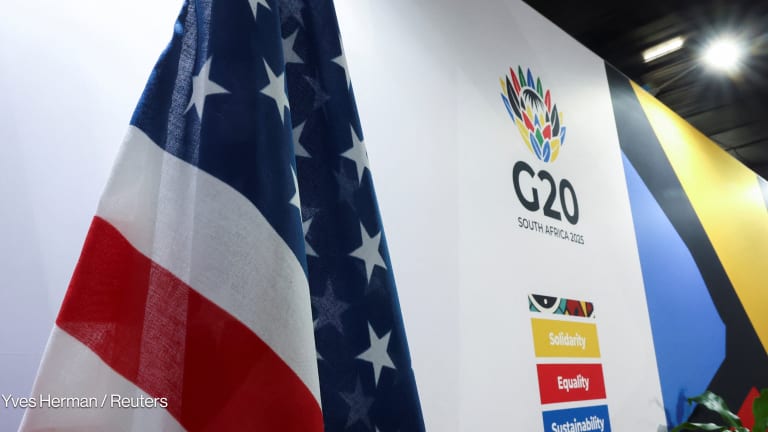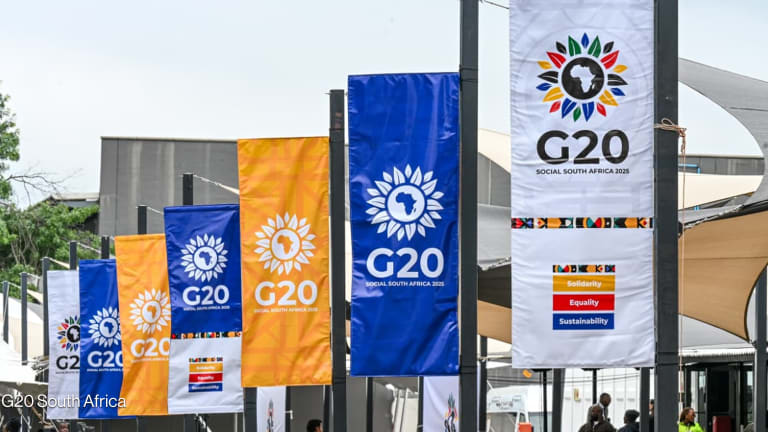
Having been closely following and engaging in the Group of 20 — made up of representatives of industrial and emerging-market nations — process for years now, we couldn’t help but notice that the G-20 is slowly losing its global relevance. It is true that this comes in an era of eroding trust in all international processes and multilateralism, but the G-20 is particularly failing to acknowledge today’s realities.
This key discussion on the failure of the G-20 to meet the aspirations and demands of global citizens, and its relation to the wider context of trust in multilateral institutions, are going to be one of the major topics during our upcoming C20 virtual summit, organized by the civil society engagement group of the G-20. As co-sherpas of the process this year — and having met and worked closely with our global network of 1,000-plus NGOs from more than 80 countries — we can express civil society’s undeniable disappointment with the continued G-20 lack of action.
We look to the G-20 at this exceptional time to restore hope and global solidarity. It is our hope that policy will reign over politics, and the G-20 will succeed in paving the way for a just recovery.
—These are six fixes that we think are necessary, practical, and easy to adopt in order to restore confidence in the G-20 as a global partnership:
1. Lead by example
The virtual C20 Summit
Join C20 as it calls the G-20 into action at the upcoming virtual C20 Summit.
Check out the program guide and register.
Since its founding in the 1990s, the G-20 has acted as the go-to global forum for urgent, coordinated, economic policy-making, and crisis response. It demonstrated its value during multiple debt crises and economic recessions over the years until it took over the G-8 role as the premier economic policy council at the leaders’ summit in 2008.
G-20's short-lived success goes beyond economic policy. For example, in 2014, it saw success in mobilizing a global response to the Ebola outbreak in West Africa, demonstrating G-20’s comparative advantage in addressing “longer-term systemic issues and gaps in capability, preparedness and response capacity that expose the global economy to the impacts of infectious disease and announcing a range of measures to strengthen national, regional and global preparedness against threats posed by infectious diseases to global health.”
Sadly, we are yet to see a similar collective response to COVID-19. While the magnitude of the current crisis is likely to have caught G-20 countries by surprise, it’s hard not to notice that the G-20’s ability to work together in times of a global crisis is fading away.
For the G-20 to remain relevant, its leaders not only need to show leadership and courage at home but also at the global level, beyond politics and geopolitical considerations. We need G-20 countries to lead by example, showing solidarity to equitable access to COVID-19 innovations, pioneering sovereign debt cancellation, and compromising for a fair allocation of taxing rights.
2. Open up the club
For many civil society actors, the legitimacy of the G-20 process is under question. Being a self-appointed exclusive club is against the true spirit of global solidarity, and undermines the global south and vulnerable countries whose lives and livelihoods are directly impacted by G-20 decisions.
We need a revamped G-20 process that empowers all voices and countries. Every nation has the right to be involved in any global decision, and the G-20 needs to find a global, consultative process to widen participation and support existing universally-inclusive multilateral frameworks, such as the United Nations. It does not matter if it’s more efficient to make decisions with fewer people around the table, what matters is that these decisions are serving everyone everywhere equally.
Establishing a gender working group to ensure the eight historic commitments made by the G-20 toward gender equality are properly implemented is also key.
3. Break down the silos between G-20 tracks
The dynamics of the G-20 decision-making process is becoming increasingly complex, with more than 20 working groups under the finance and sherpa tracks. Only allowing economic and financial issues to be discussed behind closed doors by finance ministers and central bankers is counter-intuitive. Global issues of development, education, health, climate, and other conventional sherpa track topics have serious economic and financial considerations, ramifications, and implications that need continued coordination across both G-20 tracks.
The G-20 cannot afford to continue speaking in silos about issues that are closely intertwined. A truly comprehensive and inclusive decision-making process is a prerequisite for the G-20 to regain its relevance in today’s world.
4. Invite meaningful stakeholder engagement
As an officially recognized engagement group, the C20 has spent years advocating for the full inclusion and consideration of input from civil society and major stakeholders. The current engagement mechanism is weak, disempowering, and sometimes tokenistic. The G-20 needs to reinvent its process to allow for stakeholder engagement. It should open its decisions up to the scrutiny and input of stakeholders including civil society, businesses, workers, women, youth, scientists, and every global citizen.
5. Talk and act more
The G-20 is, by design, a multilateral cooperation forum where dialogue is facilitated, views are exchanged, and consensus is built. The G-20 needs to invest more in its process, taking the space and time to discuss serious matters of global concern, in a constructive process, free from political and geopolitical considerations.
We truly believe that having more joint-ministerial discussions is key to bridging the internal divide in the G-20 process. We call for an annual G-20 joint ministerial meeting for finance and health ministers, as well as a similar joint meeting for ministers of education and of the digital economy. These are key to coordinating just responses to the global health and education crisis.
6. Improve accountability and transparency
The G-20 remains one of the most difficult global processes for citizens to understand. This is because the G-20 has no permanent secretariat. The G-20 presidency changes every year through a troika system from one country to another and each host country builds a new G-20 secretariat from scratch.
Simple documentation and archiving of G-20 activities is unavailable, making the process hard to track. While the German and Saudi presidencies have been better at this, typically G-20 presidencies don’t share their calendar of events or the outcome documents of official meetings and declarations online.

Finally, the G-20 needs to hold itself accountable to decisions, promises, and commitments made over the years. As civil society, we provide an independent point of view by evaluating progress on G-20 commitments and demanding national monitoring and reporting mechanisms. Many big promises have been made during G-20 summits, but few have been followed through.
The G-20 will certainly lose relevance if it continues to offer a lot of talk and little action. The only way to showcase dedication is by opening itself up to scrutiny and evaluation, with a dedicated process around public transparency. The first step toward this is to make reports, meetings, agendas, and outcome documents free and accessible online. Only then, citizens and the media can exercise their oversight role and rebuild public trust in the G-20.
We look to the G-20 at this exceptional time to restore hope and global solidarity. It is our hope that policy will reign over politics, and the G-20 will succeed in paving the way for a just recovery.
To find out more, register to join the C20 virtual summit.









